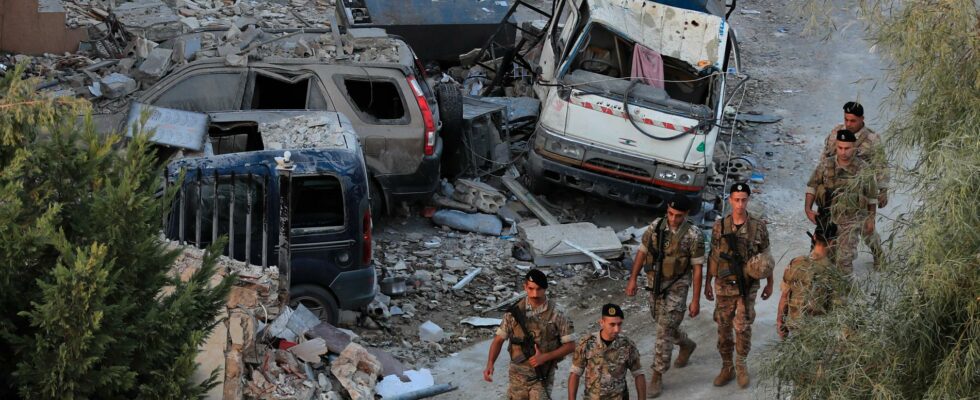unsaveSave
expand-left
full screen Lebanese soldiers after an Israeli attack south of Beirut earlier this fall. Photo: Mohammad Zaatari/AP/TT
The cease-fire that has begun between Israel and Hezbollah in Lebanon brings with it a great responsibility for the Lebanese army. Compared to Hezbollah’s forces, the military is very weak, but must now try to assert power in the southern parts of the country.
– I think everyone realizes that this is an agreement with many flaws, says analyst Aron Lund.
Hezbollah will no longer be allowed to be in southern Lebanon according to the ceasefire agreement that came into force overnight on Wednesday. Only Lebanon’s security forces and the regular army will be allowed to carry arms or deploy forces in southern Lebanon.
The same type of agreement was already concluded in 2006, but the Lebanese military has not had the power to remove the powerful Shia Muslim organization from the area south of the Litani River and down to the border with Israel.
According to Aron Lund, Middle East analyst at the Total Defense Research Institute (FOI), the Lebanese military will not be able to stop Hezbollah this time either if the organization decides to continue operating south of the Litani River.
– The military can in various ways constitute obstacles that Hezbollah must circumvent. But if the military is to fight Hezbollah, it is a Lebanese civil war, and it is not on the map.
– Nobody in Lebanon wants that, says Lund.
“Not so brilliant”
Still, there is some hope for a different development this time, as Hezbollah, weakened by Israel’s attacks, now has other incentives.
– Only the will to have a working ceasefire will affect the situation. Then I think everyone understands that this won’t be so brilliant, but it’s what you can do, says Aron Lund.
The Lebanese military, like other state activities in the country, has been hit hard by the economic crisis that hit in 2019. The soldiers have not been paid and the state has not been able to finance daily operations. Instead, the United States and a number of allied countries have begun funding parts of the Lebanese military.
Not perfect
There is still a lot to argue about and everyone is aware that the agreement is not perfect, says Aron Lund.
– I think everyone realizes that this is an agreement with many flaws that will need to be patched and fixed over time. Everyone will be unhappy with it in the end, just as everyone has been unhappy with the last agreement from 2006 and with previous agreements.
– Then the partners can feel in different ways that this is not working, now we ignore this. It is not the first time a ceasefire has collapsed in that case.
FACTS Hezbollah to move weapons – Israel to leave Lebanon
The terms of a ceasefire in Lebanon are not completely nailed down, but the first phase is largely complete. It consists of a two-month transition period. During the 60 days, Israel’s military leaves southern Lebanon. Hezbollah is moving all of its heavier weapons north of the Litani River.
A committee led by the United States checks that the parties are doing what they are supposed to. If Lebanon and others do not remove urgent threats to Israel, there is a caveat that Israel has the right to act militarily.
Gradually during the two-month period, hundreds of thousands of evacuated civilians will also be able to start returning to their homes in northern Israel and southern Lebanon respectively.
Read moreFACTSStopped the last war
In August 2006, the UN Security Council adopted Resolution 1701 aimed at ending the war between Israel and the Lebanese Shia militia Hezbollah.
Israel withdrew after a 34-day invasion of its neighboring country. It had been launched after Hezbollah staged a rocket attack as a diversion for an attack near the border, in which several Israeli soldiers were killed and others kidnapped.
The resolution confirmed the “blue line” between Israel and Lebanon which has come to constitute a de facto border between the countries. North of the line, a security zone was established that extends a few miles into Lebanon up to the Litani River. It was decided that only UN peacekeeping forces (UNIFIL) and forces from the Lebanese Regular Army would be allowed there.
Israel was ordered to withdraw all forces south of the line. In addition, demands were made that all militia groups in Lebanon would be disarmed so that the Lebanese state would be the only armed force in the country, which has not happened.
Read more
